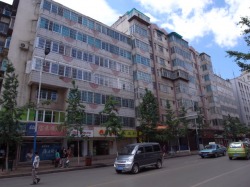 Hello beautiful bars... A lot of time, money and health & safety violations are being put into pulling down every single balcony in Kunming. Why? The local government is hoping to win the 2010 Beautiful Chinese City award. I'm sure it crossed their minds that replacing some rotten boards, scrubbing canopies and encouraging residents to fill the balconies with pot plants (if they hadn't already done so) might make the city more beautiful. Instead, however, they are stripping everything back to white tiles and putting shiney, poor quality bars on all the windows, aiming for a more Penitentiary City look. China might be 'opening up' but it seems that homogeneity is still the order of the day in the Middle Kingdom. What's more, like Mao's killing of sparrows and melting down of steel during his glory days, this current policy is being implemented on a mass scale. What I'd like to know, however, is who that balcony on the 4th floor belongs to [centre of photo].
This is your new blog post. Click here and start typing, or drag in elements from the top bar.
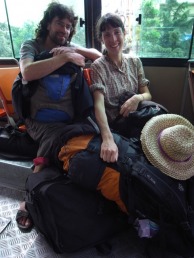 I have to confess to using an online dictionary to check the term for inhabitants of Quebec, in case your wondering whether that's right or not. We had a fascinating journey from Dali to Kunming today, thanks to our travel companions Daphnee and Daniel, from Quebec. They have been travelling for two years, a few weeks of which have been in China, and are now heading over to Guangdong to find out what's wrong with Daphnee's digestive system. It seems she's been ill for some time and could have written a book about the hospitals of Asia.
The couple have a number of fascinating projects on the go and, during their travels, are studying and documenting a vast range of topics - including traditional medicine and yoga - for future ventures back in Canada. I wished we had longer together, but such is the nature of travelling. We bid them farewell on the No 80 bus, mid-way between the bus and railway station. If you're reading this Dada and Daphnee, all the best for the rest of your journey.....however long that may be.
Oh, nearly forgot the French. They labelled us "Anglaises" early on and didn't speak to us the whole day. I tried the old, "Nous sommes Ecossaises" but it clearly wasn't enough. Oh, now I need to check a French dictionary to see if those adjectives 'agree'. It's a long time since I've used my French.
P.S. Ali's somewhere in Dali still, after his short adventure up to Shaxi. More on that later, I hope.
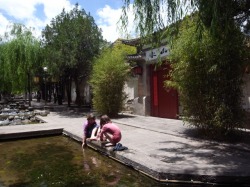 Ali's gone to Shaxi, a small village on the Ancient Tea Horse Trail, and I'm hanging around in Dali. This morning I sat by the stream studying Chinese while Freda and Edie played. They returned to the room soaking wet but happy. Edie seemed to be covered in little snail shells, much to her delight. It's been great having fun and safe areas to play right outside our door and will be quite hard readjusting to life in a fourth-floor flat. No streams but it's fun taking the ducks to the College pond, I suppose. I miss Scotland.
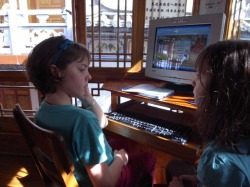 Freda 'at work' on the phone. Freda and Edie are used to helping us out with Chinese here and there, but their language skills have proven to be very useful for the Yu Yuan Guesthouse, where we're staying in Dali. When the patrons and customers are struggling to understand each other, Freda (as the eldest) is called in for a bit of simultaneous translation - tricky even for a professional interpreter, especially when she's dealing with non-native speakers of English using the language with limited levels of proficiency. She's helped out an Israeli couple in need of train tickets, a French couple wanting to change rooms and a sleepy German. She even got on the phone last night and booked Sue's accommodation in Lijiang. We know where she can come for holiday work in the future.
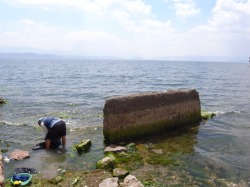 Washing clothes in Erhai Lake. While Ali and Edie braved the crowds of San Yue Jie (March festival, according to the lunar calendar) Sue, Freda and I took a local bus to the Bai village of Longkan, on the shores of Erhai Lake. During our fifteen minutes by the lakeside we saw a fisherman catching whitebait, a Bai woman washing her clothes and a younger woman rinsing her vegetables for lunch. A local farmhouse boasted a yardful of healthy-looking chickens and four cormorants, used locally for fishing. Before taking the bus back to the busy old town we paid a brief visit to a temple and dropped off some gifts at the house of an ex-student. Unfortunately her parents were napping so we didn't have the chance to say hello. One of the highlights of the trip for me was the bus journey back as we wound through narrow village lanes that serve this farming community. There's never a shortage of things to look at out the window - fields, market stalls, livestock, women in their brightly-coloured ethnic costumes, goatie-bearded men with long pipes - experiencing this kind of 'normality' in developing, tourist-oriented China is rare and refreshing. Local bus journeys are usually a good place to start.
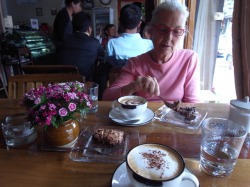 Sue can't take her eyes off her cake... Something equally rewarding though not at all 'normal' for us these days was a cappuccino and slice of chocolate in The Sweet Tooth. This cafe came recommended to us by a Canadian three years ago. Unlike many other cafes and shops displaying European-style coffees and cakes, this DOES live up to expectation. What's more, the cafe is part of a project supporting hearing-impaired people in the Dali community...so we decided it would have been unethical not to support it. This was Sue's treat so I couldn't bring myself to look at the cash register when she went to pay - probably the equivalent to two nights' accommodation in the guest house.
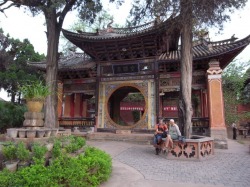 Ali and Sue in the park We paid our second visit to the small town of Weishan, in Dali Prefecture. Our discovery of yet more old and well-preserved buildings and parks left me with a conundrum - how did Weishan survive the ravages of the Cultural Revolution to a much greater extent than other places we have visited, even compared to Dali old town. Many old murals, wood carvings and painted pillars that date back to before the 1970s remain intact. Another puzzle is why the people of Weishan are still living in traditional wooden houses and renovating old ones, rather than ripping them down like there's no tomorrow and replacing them with white-tiled monstrosities. The Government, apparently, is devoted to preserving Weishan's architectural heritage. What's more, the community, by and large, supports this. There are tight building restrictions and occasional grants for home improvements.
I don't believe that the same government was in power in the '70s but perhaps the anti-CR part of the community was stronger than those inclined to take up the mantle of the Red Guards? Loss of architecture is not just the result of destructive idealist fanatics however. Last month a fire (consequence of Yunnan's current drought) broke out on Wei Baoshan (the local sacred mountain) and burnt down the highest and oldest temple. All that remains is a thick wooden door frame.
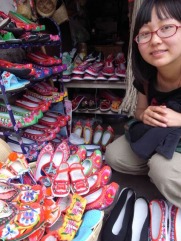 Katrina with Weishan shoes We first discovered Weishan when we arranged to visit Li Yanhui (Katrina), who graduated from Simao Teachers' College in 2008. I first met Katrina in 2005, when she attended a VSO workshop in Kunming, along with me and Chen Yong. I taught Katrina when she was in Grade 2 (Vision and Listening) and Grade 3 (Writing) but we lost touch after that, until a chance encounter through another graduate. Weishan is her hometown, where she lives in a traditional timber home that's been in her family for three hundred years.
When Sue and Ali headed to Dali yesterday morning, Freda, Edie and I decided to stay in Weishan for another day, to spend some more time with Katrina. We visited her mum in the market, where she sells salted ham. We also spent time discussing Katrina's work and study aims. Although she graduated as a teacher, she has been unable to get a teaching job. She is currently working for the local government, in a small village nearby. She's on the lowest rung of the ladder and can be asked to do anything from office work to sweeping leaves up on the village square. She relies on an evening phonecall from the village leader to tell her when she must arrive at work the next day. In hope of promotion, Katrina took some exams in April. A high score will secure her a leadership post. This means she will have plenty of time in a remote village sitting at a computer.
She hopes to set up an internet business, selling Weishan handicrafts, such as these embroidered shoes. Her aim isn't to become rich, but to have some autonomy and promote her local culture. Meantime she is still studying for her teaching exams in August. To become a teacher is her main goal. I find it sad that such an out-going, open-minded and capable graduate should find it so hard to get a job, as a result of a recruitment system that cares for nothing but exam scores. What's more, the exam they must pass cares nothing for but theory and lucky guesses in multiple choice. Teaching aptitude and character stand for nothing.
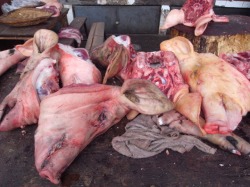 Do you have a head for heights of butchery in a Chinese market? 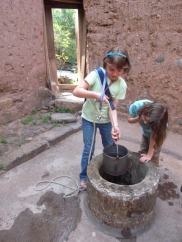 Freda drawing water from Katrina's well.
|
